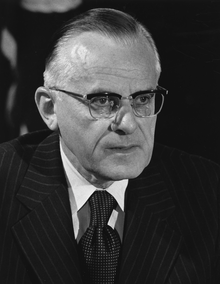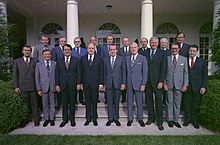
Gerald Ford's tenure as the 38th president of the United States began on August 9, 1974, upon the resignation of President Richard Nixon, and ended on January 20, 1977. Ford, a Republican from Michigan, had been appointed vice president on December 6, 1973, following the resignation of Spiro Agnew from that office. Ford was the only person to serve as president without being elected to either the presidency or the vice presidency. His presidency ended following his narrow defeat in the 1976 presidential election to Democrat Jimmy Carter, after a period of 895 days in office. His 895 day presidency remains the shortest of all U.S. presidents who did not die in office.
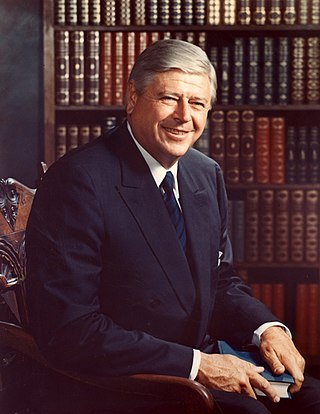
Rogers Clark Ballard Morton was an American politician who served as the U.S. Secretary of the Interior and Secretary of Commerce during the administrations of presidents Richard Nixon and Gerald Ford, respectively. He also served as a member of the U.S. House of Representatives from Maryland.

Orville Clarence Redenbacher was an American food scientist and businessman most often associated with the brand of popcorn that bears his name which is now owned by Conagra Brands. The New York Times described him as "the agricultural visionary who all but single-handedly revolutionized the American popcorn industry".

Clifford Morris Hardin was an American politician and was the Chancellor of the University of Nebraska. He served as the United States secretary of agriculture from 1969 to 1971 under President Richard Nixon.

John Albert Knebel is a former United States government official who served as secretary of agriculture under President Gerald Ford.
David Roy Butz was an American professional football player who was a defensive tackle in the National Football League (NFL) for the St. Louis Cardinals and the Washington Redskins in a 16-year career from 1973 to 1988. During his time with Washington, as the team's defensive "anchor", he helped the Redskins reach the Super Bowl thrice, winning twice. He was named as one of the 70 Greatest Redskins in franchise history and a member of the NFL 1980s All-Decade Team. Before turning professional, he played college football for the Purdue Boilermakers. He was inducted to the College Football Hall of Fame in 2014.

Gerald Rudolph Ford Jr. was the 38th president of the United States, serving from 1974 to 1977. A member of the Republican Party, Ford assumed the presidency after the resignation of President Richard Nixon, under whom he had served as the 40th vice president from 1973 to 1974 following Spiro Agnew's resignation. Prior to that, he served as a member of the U.S. House of Representatives from 1949 to 1973.
"Halloween Massacre" is the term associated with the major reorganization of United States president Gerald Ford's cabinet on November 4, 1975, which was an attempt to address multiple high-level personality and policy clashes within the administration. The overhaul came at a time when the president's leadership abilities were being broadly questioned, and he was being heavily criticized by California governor Ronald Reagan and others from the nascent conservative wing of the Republican Party.

Loose Shoes is a 1978 comedy film directed by Ira Miller and featuring Bill Murray. The film is presented as a series of movie trailers with titles such as The Howard Huge Story, Skate-boarders from Hell and The Invasion of the Penis Snatchers.
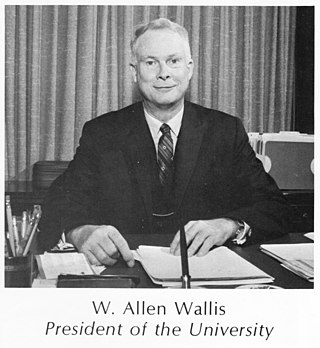
Wilson Allen Wallis was an American economist and statistician who served as president of the University of Rochester. He is best known for the Kruskal–Wallis one-way analysis of variance, which is named after him and William Kruskal.

Floyd James Fithian was an American educator and politician who served as a United States Representative from Indiana as a Democrat. He was one of the forty nine Watergate Babies who won election to the House of Representatives in the wake of the Watergate scandal during the 1974 House elections with Fithian himself defeating Earl Landgrebe, who became infamous for his stalwart defense of President Richard Nixon. He was one of the fourteen members of the House Select Committee on Assassinations (HSCA) and believed that the Kennedy assassination in 1963 was orchestrated by members of organized crime.

Charles Franklin "Chuck" Conner is a former United States deputy secretary of agriculture.

Orion Samuelson is a retired American broadcaster, known for his agriculture broadcasts and his ability to explain agribusiness and food production in an understandable way. He was inducted into the Radio Hall of Fame in 2003.

Food versus fuel is the dilemma regarding the risk of diverting farmland or crops for biofuels production to the detriment of the food supply. The biofuel and food price debate involves wide-ranging views and is a long-standing, controversial one in the literature. There is disagreement about the significance of the issue, what is causing it, and what can or should be done to remedy the situation. This complexity and uncertainty are due to the large number of impacts and feedback loops that can positively or negatively affect the price system. Moreover, the relative strengths of these positive and negative impacts vary in the short and long terms, and involve delayed effects. The academic side of the debate is also blurred by the use of different economic models and competing forms of statistical analysis.

Curtis Cleland 'Curt' Ellis is an American filmmaker, social entrepreneur, and advocate for sustainable agriculture and healthy food. He serves as co-founder and Executive Director of the nonprofit organization FoodCorps. He shared a Peabody Award in 2008 for King Corn, which he co-produced and starred in, and in 2011 he won the 17th Annual Heinz Award with longtime collaborator Ian Cheney for their work in the sustainable food movement.

Grain entrapment, or grain engulfment, occurs when a person becomes submerged in grain and cannot get out without assistance. It most frequently occurs in grain bins and other storage facilities such as silos or grain elevators, or in grain transportation vehicles, but has also been known to occur around any large quantity of grain, even freestanding piles outdoors. Usually, unstable grain collapses suddenly, wholly or partially burying workers who may be within it. Entrapment occurs when victims are partially submerged but cannot remove themselves; engulfment occurs when they are completely buried within the grain. Engulfment has a very high fatality rate.
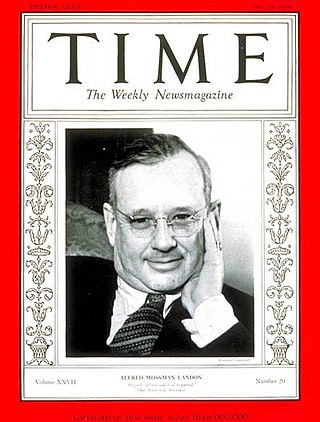
The Alfred M. Landon Lecture Series is a series of speeches on current public affairs, which is organized and hosted by Kansas State University, in Manhattan, Kansas, United States. It is named after Kansas politician Alf Landon, former Governor of Kansas and Republican presidential candidate. The first lecture in the series was given by Landon on December 13, 1966.
The Brannan Plan was a failed United States farm bill from 1949. It called for "compensatory payments" to American farmers in response to the major problem of large agricultural surpluses stemming from price supports for farmers. The Brannan Plan was named after Charles Brannan, who served as the fourteenth United States Secretary of Agriculture from 1948 to 1953 as a liberal member of President Harry S. Truman's cabinet. It was blocked by conservatives and never became law. The start of the Korean War in June 1950 made the surpluses a vital weapon and prices soared as surpluses were used up, making the proposal irrelevant.

James "Jim" Moseley is an American farmer and politician who served as the ninth deputy secretary of agriculture from 2001 to 2005 during the administration of President George W. Bush.
